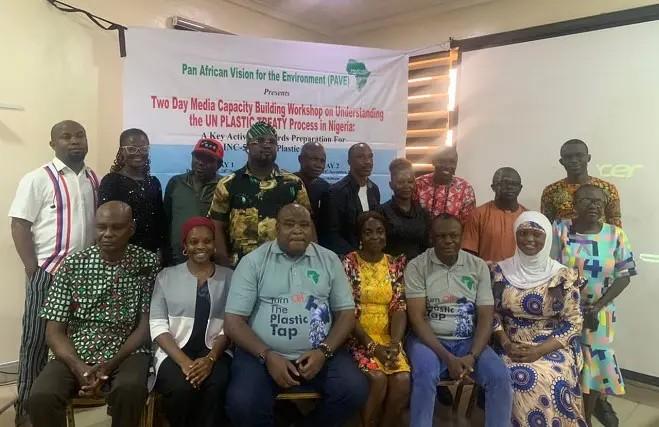Some of the participants in a group photograph.
Pan African Vision for the Environment (PAVE) has described plastic pollution as a global phenomenon with grave implications for both human life and the environment.
The outfit said that because plastic lacked economic or recycling value, there was the need for the government to ban single-use plastics from next year.
PAVE made the remarks during a two-day media capacity building workshop it organized on the theme, “Understanding the UN Plastic Treaty Process in Nigeria,” with the support of the Global Greengrants Fund (GGF) in Lagos.
PAVE is a member of the Global Alliance for Incineration Alternatives (GAIA) and Break Free From Plastics (BFFP).
The Executive Director of PAVE, Anthony Akpan, said that plastic was toxic and contains properties that leach into food, homes and environment, producing negative effects on human health.
On the topic, “The Plastic Age,” Akpan noted the proliferation of plastics as cups, water bottles, diapers among others in use today, with third-world countries among the most affected.
Also read: ERA-FoEN, groups want Coca Cola, others held accountable for plastic pollution
Akpan also debunked the general misconception that plastic is largely recycled.
His words: “Plastic is everywhere around us, and microplastics have been found in human bodies, posing a threat to humanity.
“Is 90% of plastic recycled? False, only about 10% of plastic produced since 1950 has been recycled. The rest still exist in the system. We cannot recycle ourselves out of the plastic pollution crisis; the best way is to stop the production of plastics.”
Akpan further stated that humans use about 1.2 billion plastic bottles every day, roughly half of the global annual production of Western products.
He emphasized that plastic is toxic and can affect human health, containing 16,000 different chemicals, 4,200 of which are hazardous to human and environmental health.
He added that plastic leakage is expected to double to 44 million tonnes per year due to the buildup of plastic in aquatic environments and triple by 2060.
“Plastic takes a long time to decompose; 30 years for plastic bags and coffee cups, 20 years for plastic cups, 40 years for water bottles, and so on,” Akpan said.
Victor Fabunmi, the spokesperson for Sustainable Research and Action for Environmental Development (SRADev Nigeria), said that there was the need not only to ban the use of single-use plastics like cutlery, straws, and disposable bags but also to manage plastic waste throughout its lifecycle.
Fabunmi further canvassed the implementation of tax incentives or subsidies for industries adopting eco-friendly alternatives.
Philip Jakpor, the Executive Director of Renevlyn Development Initiative (RDI), urged newsmen to report plastic pollution holistically and strategically.
Jakpor said that plastic stories carry human face, even as it emphasises “interconnectedness of man and the environment, obtain and simplify statistics, speak to experts, ask probing questions, predict and amplify solutions.”
Already, 16 out of the 54 African states that have passed a law concerning plastic have totally banned plastic bags.
The move is seen as a step in the right direction towards addressing the plastic pollution crisis in Africa.
……………
For more interesting stories click: nigerianewsflight.com.ng












